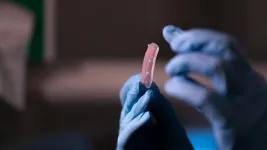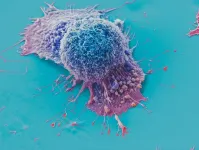(Press-News.org) April 18, 2024, TORONTO – A new round of clinical trials supported by the Ontario Institute for Cancer Research (OICR) will harness a unique opportunity to test some of the newest treatment strategies for a range of different cancers.
OICR has announced two new clinical trials as part of its Window-of-Opportunity (WOO) Network, which brings together Ontario researchers, clinicians and patients to study the biology of newly diagnosed and recurrent tumours.
“‘Window-of-opportunity’ clinical trials take advantage of the two-to-eight-week period between the diagnosis of cancer and the surgery to remove the cancer, at a time when no treatment is happening,” says Surgical Oncologist, OICR Associate Scientist, and WOO Network Co-lead Dr. Angel Arnaout. “WOO Network trials capitalize on this window to study the biological effect of new cancer treatments without delaying or altering a patient’s primary treatment strategy.”
“Testing cancer therapies during this window of time allows us to understand and measure how they work against the tumour, and we’re very grateful to patients who participate in these studies and provide us this exceptional opportunity,” says WOO Network Co-lead Dr. Melanie Spears, who is also a Principal Research Scientist at OICR and Co-Director of the Institute’s Diagnostic Development program.
These latest WOO Network trials focus on liver cancer and head and neck cancers, and seek to understand how immunotherapies work alongside other innovative treatments to prepare a patient’s immune system to fight cancer. They will both also look for biological clues called ‘biomarkers’ that could indicate which patients would benefit most from different treatments.
Dr. Sara Kuruvilla and Dr. Anthony Nichols of the London Regional Cancer Program at London Health Sciences Centre (LHSC) and Lawson Health Research Institute will investigate the effectiveness of a novel immunotherapy drug combination before surgery to remove head and neck tumours, including monitoring how patients’ immune systems respond and if they experience fewer side effects from surgery. Findings are expected to provide preliminary evidence to support further evaluation of this approach in larger clinical trials.
“Recurrence is common after surgery for mouth and throat cancers, and surgical treatment can severely impact patients’ quality of life. We hope that receiving immunotherapy before surgery can improve a patient’s immune response, improve their outcomes and reduce the side effects they face.” – Dr. Sara Kuruvilla, Medical Oncologist at LHSC, Associate Scientist at Lawson, and Associate Professor of Oncology at Western University’s Schulich School of Medicine & Dentistry
Dr. Pablo Serrano and Dr. Brandon Meyers of Hamilton Health Sciences and McMaster University will study how a common immunotherapy (Durvalumab) impacts liver tumours after patients have stereotactic body radiation therapy (SBRT) but before they have surgery, with hopes that the combination strengthens patients’ immune systems to fight cancer.
“We aim to see if the combination of immunotherapy and radiation therapy can increase the number of immune cells that attack cancer, reduce the number of immune cells that allow cancer to grow, and potentially improve the prognosis of patients with liver cancer.” – Dr. Pablo Serrano, Scientist at Escarpment Cancer Research Institute (Hamilton Health Sciences and McMaster University) and Associate Professor of Surgery at McMaster University
These new clinical trials join OICR’s existing portfolio of WOO Network trials, which explore various therapeutic approaches and the impact they have on immune response in patients with a variety of cancers including lung, breast, pancreatic and bladder cancers.
OICR created the WOO Network in 2020 to help build Ontario’s capacity for state-of-the-art clinical trials by funding studies, mentoring new investigators and connecting scientists, clinicians, patient and industry partners.
“OICR’s WOO Network is a landmark program that leverages our capabilities in genomics and biomarker discovery to improve the drug development paradigm and better understand how new therapies work,” says OICR President and Scientific Director Dr. Laszlo Radvanyi. “In its third year of operation, the network is already yielding important insights about different types of cancers and the best ways to treat them. These newest trials will drive even more innovations to treat cancer more precisely and give patients the best chance at longer, healthier lives.”
“The Ontario government is proud to support new discoveries and innovations in cancer research by funding the work of OICR,” said Jill Dunlop, Minister of Colleges and Universities. “New clinical trials are key to testing therapies that have real-life impacts for patients in Ontario, ultimately helping them lead longer and healthier lives.”
END
New “window-of-opportunity” clinical trials explore cutting-edge treatments for cancers of the liver, head and neck
Two new studies join the Ontario Institute for Cancer Research (OICR) portfolio of Window-of-Opportunity (WOO) Network clinical trials
2024-04-18
ELSE PRESS RELEASES FROM THIS DATE:
Can bismuth prevent oil leaks – (and save Norwegians billions)?
2024-04-18
Over the next 25 years, as the world shifts away from fossil fuels, the oil and gas wells that have sustained the fossil fuel age will have to be plugged.
No big deal, you might think, drilling those wells was the hard part. Plugging them should be no problem. But think again.
The Norwegian Continental Shelf, as an example, is punctured by more than 2000 wells. Harald Linga, centre director for SWIPA (see box), a Centre for Research Based Innovation based at SINTEF, Scandinavia’s largest independent research institute, estimates that plugging them using today’s technology will cost upwards of NOK 800 billion – that’s USD 73 billion.
And while oil ...
Atmospheric isotopes reveal 4.5 billion years of volcanism on Jupiter’s moon Io
2024-04-18
Sulfur and chlorine isotopes in the atmosphere of Jupiter’s moon Io indicate that it has been volcanically active for the entire 4.57 billion-year history of the Solar System, according to a new study. The findings offer new insights into the moon’s history. Io is the most volcanically active body in the Solar System. This extreme level of volcanic activity is the result of tidal heating from friction generated within the moon’s interior as it is pulled between Jupiter and its neighboring moons of Europa and Ganymede. However, how long Io has hosted such extensive ...
An ink for 3D-printing flexible devices without mechanical joints
2024-04-18
For engineers working on soft robotics or wearable devices, keeping things light is a constant challenge: heavier materials require more energy to move around, and – in the case of wearables or prostheses – cause discomfort. Elastomers are synthetic polymers that can be manufactured with a range of mechanical properties, from stiff to stretchy, making them a popular material for such applications. But manufacturing elastomers that can be shaped into complex 3D structures that go from rigid to rubbery has been unfeasible until now.
“Elastomers are usually cast so that their composition cannot be changed in all three dimensions over short length scales. To overcome ...
Association for Chemoreception Sciences (AChemS) 46th Annual Meeting
2024-04-18
Media Contact:
Dr. Alissa Nolden, Chair - Public Information & Affairs Committee, anolden@umass.edu
Bonita Springs, FL— The Association for Chemoreception Sciences (AChemS) stands as a premier organization dedicated to advancing the understanding of chemosensory systems. With a rich history spanning over four decades, AChemS has played a pivotal role in fostering interdisciplinary research and collaboration in the fields of taste, smell, and chemical senses. AChemS provides a platform for scientists, clinicians, and industry members from diverse backgrounds to exchange ideas, present cutting-edge research findings, and address pressing challenges ...
How the Birmingham Drug Discovery Hub created an investment-ready ‘drug library’
2024-04-18
A novel approach to drug discovery is enabling University of Birmingham researchers to overcome the ‘valley of death’, where projects fail due to the funding gap between original research and commercial investment.
The approach, detailed in a feature published in the April issue of Drug Discovery Today, has attracted more than £4m in industry funding, grants and industry awards, on the back of just £0.2m investment from the University’s Dynamic Investment Fund (DIF).
The Birmingham Drug Discovery Hub ...
Scientists uncover 95 regions of the genome linked to PTSD
2024-04-18
In posttraumatic stress disorder (PTSD), intrusive thoughts, changes in mood, and other symptoms after exposure to trauma can greatly impact a person’s quality of life. About 6 percent of people who experience trauma develop the disorder, but scientists don’t yet understand the neurobiology underlying PTSD.
Now, a new genetic study of more than 1.2 million people has pinpointed 95 loci, or locations in the genome, that are associated with risk of developing PTSD, including 80 that had not been previously identified. The study, from the PTSD working group within the Psychiatric Genomics Consortium (PGC - PTSD) together with Cohen ...
AI tool predicts responses to cancer therapy using information from each cell of the tumor
2024-04-18
With more than 200 types of cancer and every cancer individually unique, ongoing efforts to develop precision oncology treatments remain daunting. Most of the focus has been on developing genetic sequencing assays or analyses to identify mutations in cancer driver genes, then trying to match treatments that may work against those mutations.
But many, if not most, cancer patients do not benefit from these early targeted therapies. In a new study published on April 18, 2024, in the journal Nature Cancer, first author Sanju Sinha, Ph.D., assistant professor in the Cancer Molecular Therapeutics ...
CEOs’ human concern translates into higher stock price
2024-04-18
Compassionate leadership has tangible benefits: CEOs’ expressions of empathy correlate with positive stock performance, a study led by the University of Zurich shows. The researchers analyzed data from conference calls between CEOs and financial analysts during the COVID-19 pandemic.
The COVID-19 pandemic prompted an unprecedented financial crisis. Between 24 February 2020, and 20 March 2020, the value of U.S. companies on the stock market decreased significantly, surpassing the decline during the 2008-2009 financial crisis.
At the onset of the pandemic, several CEOs made statements ...
Smoking-related deaths could be reduced if people attending lung cancer screening are offered stop-smoking support
2024-04-18
A new study has found that by offering stop smoking support as part of the national lung cancer screening programme, there is potential to save lives, and dedicated funding must be considered by policy makers.
The results of the study, published in the European Respiratory Journal, showed that offering stop smoking support at the same time and in the same place as lung screening, resulted in a high uptake of support across a range of demographic characteristics.
This has the potential to reduce smoking-related illness and death in a high-risk ...
Quick decisions in soccer enhanced by brain’s ability to suppress actions
2024-04-18
To pass or not to pass, that is the question faced by soccer players the world over in every match. It might be unsurprising that higher skilled players exhibit better execution of actions than lower skilled ones, but now an Osaka Metropolitan University-led research team has evidence that the neural process to suppress actions also plays an important role.
Research Center for Urban Health and Sports Assistant Professor Takahiro Matsutake and colleagues conducted an experiment to see how three levels of soccer players perform when faced with the same tasks.
The ...
LAST 30 PRESS RELEASES:
ASU researchers to lead AAAS panel on water insecurity in the United States
ASU professor Anne Stone to present at AAAS Conference in Phoenix on ancient origins of modern disease
Proposals for exploring viruses and skin as the next experimental quantum frontiers share US$30,000 science award
ASU researchers showcase scalable tech solutions for older adults living alone with cognitive decline at AAAS 2026
Scientists identify smooth regional trends in fruit fly survival strategies
Antipathy toward snakes? Your parents likely talked you into that at an early age
Sylvester Cancer Tip Sheet for Feb. 2026
Online exposure to medical misinformation concentrated among older adults
Telehealth improves access to genetic services for adult survivors of childhood cancers
Outdated mortality benchmarks risk missing early signs of famine and delay recognizing mass starvation
Newly discovered bacterium converts carbon dioxide into chemicals using electricity
Flipping and reversing mini-proteins could improve disease treatment
Scientists reveal major hidden source of atmospheric nitrogen pollution in fragile lake basin
Biochar emerges as a powerful tool for soil carbon neutrality and climate mitigation
Tiny cell messengers show big promise for safer protein and gene delivery
AMS releases statement regarding the decision to rescind EPA’s 2009 Endangerment Finding
Parents’ alcohol and drug use influences their children’s consumption, research shows
Modular assembly of chiral nitrogen-bridged rings achieved by palladium-catalyzed diastereoselective and enantioselective cascade cyclization reactions
Promoting civic engagement
AMS Science Preview: Hurricane slowdown, school snow days
Deforestation in the Amazon raises the surface temperature by 3 °C during the dry season
Model more accurately maps the impact of frost on corn crops
How did humans develop sharp vision? Lab-grown retinas show likely answer
Sour grapes? Taste, experience of sour foods depends on individual consumer
At AAAS, professor Krystal Tsosie argues the future of science must be Indigenous-led
From the lab to the living room: Decoding Parkinson’s patients movements in the real world
Research advances in porous materials, as highlighted in the 2025 Nobel Prize in Chemistry
Sally C. Morton, executive vice president of ASU Knowledge Enterprise, presents a bold and practical framework for moving research from discovery to real-world impact
Biochemical parameters in patients with diabetic nephropathy versus individuals with diabetes alone, non-diabetic nephropathy, and healthy controls
Muscular strength and mortality in women ages 63 to 99
[Press-News.org] New “window-of-opportunity” clinical trials explore cutting-edge treatments for cancers of the liver, head and neckTwo new studies join the Ontario Institute for Cancer Research (OICR) portfolio of Window-of-Opportunity (WOO) Network clinical trials



